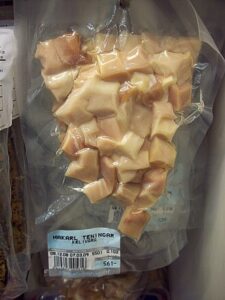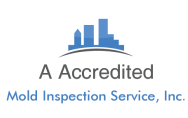TOXIC MOLD GROWTH IN FOOD

Rotten sleeper shark meat is popular in Iceland and is harmless. Most people who did not grow up with it say it taste horrible. Photo courtesy of Wikipedia.
Not everyone is in agreement as to the effects of toxic mold when breathing spores from toxic mold. However, it is a well-known fact that toxic mold growth in food is very dangerous.
There is lots of misinformation about toxic mold online. We are not sure about what mold may or may not do when breathed in. However, there is strong scientific evidence and documented history that shows the harm toxic mold growth in food can cause when consumed.
We often neglect to inspect for mold is the place where it can do the most toxic harm, and that is in our food. Homes, schools, and restaurants, all sometimes serve moldy foods.
However, consuming too much of the wrong types of moldy food can be very dangerous. Poisonous mycotoxins produced by toxicogenic molds have been found in grains and nuts, celery, grape juice, apples, and other produce. “The Food and Agriculture Organization (FAO) of the United Nations estimates that 25% of the world’s food crops are affected by mycotoxins.”
Personal Experiences with Bad Mold in Food
I am reminded of shopping for Sorrel in a massive flea market in Fort Lauderdale Florida. Sorrel is dried hibiscus like flowers used to make a sweet red drink popular in Jamaica and parts of Central America. Upon closer examination, I noticed that all the bags of Sorrel at one vendors stand were heavily contaminated with mold. The tea bearing flowers had not been dried out prior to being packaged in plastic bags.
I am also reminded of a long night of severe diarrhea and vomiting after eating Carbo cubes from a Whole Foods. This occurred while on vacation in Sarasota Florida. It messed up one day of my vacation.
According to the USDA, everyone shopping in a supermarket should examine food well before buying it and don’t buy moldy food. Always check fruits, vegetables, grains, and other such products for mold in food. Be very careful with dried granola, carbo cubes, organic nuts, and other such items in unrefrigerated bins at health food stores.
Many people have had the experience of buying a burrito or sandwich at a gas station or corner store and biting into it. After that first bite a nasty taste is detected. You look at the food all too late only to see a patch of green mold growing on it. Hopefully you did not swallow.
Another time while in Miami I drank Soursop juice. It was sour, and a little spoiled. Because of it’s name I thought it was supposed to be that sour. I continued drinking it. The sour taste was primarily due to spoilage, and I became violently ill.
Fermented Foods
Sometimes moldy or bacteria filled food is harmless. We call these fermented foods. It all depends on the type of mold or bacteria in the food. Some examples of fermented foods include pepperoni, salami, prosciutto ham, and cured country ham, as well as many cheeses, kefir, and various other dairy products. Such organisms have been allowed and even encouraged by humans to grow on such fermented foods. These microorganisms have proven to be harmless to humans when eaten.
Foods and drinks with such good molds and beneficial bacterial colonies are often very healthy. The growth of beneficial molds and bacteria gives fermented foods a nice aroma and taste. These growth aid in protecting the food from being colonized by toxic molds, food born illness causing bacteria, and decay causing bacteria.
This year I did a mold inspection in Miami the client was very fearful of mold in her condo. However, this same lady was dedicated to fermenting a wide variety of foods. I think she had five different fermented foods and drinks in her kitchen. They are all likely harmless and even very healthy, and yes they were all good tasting.
One Strange Fermented Food You Did Not Know You Were Consuming
The strangest fermented foods are an Asian sauce made by putting fish organs, guts and all in a jar then burying it in the ground for a few months. You may have eating sauces made with this concoction at an Asian restaurant and not even known it. And of course, there is fermented rotten shark from Iceland, and rotten fish is eating in Finland, and also by Eskimos in the Americas. It is supposed to be quite smelly and foul tasting to people who have not acquired a taste for it.
 What Can I Do to Protect Myself and My Family from Toxic Mold in Food?
What Can I Do to Protect Myself and My Family from Toxic Mold in Food?
Inspect the food and produce you buy carefully for indications of unintentional mold and decay.
Store all produce and leftovers in clean containers so that airborne mold can’t land and grow on it.
Avoid cross contamination, for example do not touch food with dirty hands or dirty utensils then put it in a container and store it.
Make sure food that is supposed to be dry is dry before storing it.
It is very important to store most foods in the refrigerator.
Regularly inspect your refrigerator vegetable bend for rotten and moldy foods and discard such items.
Be careful what restaurant you eat at when you eat out.
If you own a restaurant it’s good business to make sure staff are handling food properly. In addition, when your establishment is inspected by the health department follow the health inspectors recommendations. It could save your restaurant’s reputation.
For information on mold in baby toys and other household items check out this other page on our website.
 A Accredited Mold Inspection Service
A Accredited Mold Inspection Service
We provide mold inspections and testing and even chemical related indoor air quality testing
in
homes, restaurants, schools, offices, and yachts.
We have provided mold inspections and mold testing since 2003.
Call us if you need our services. 1-888-381-6651.
